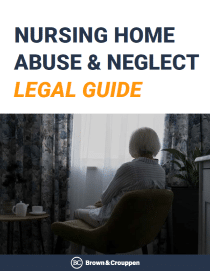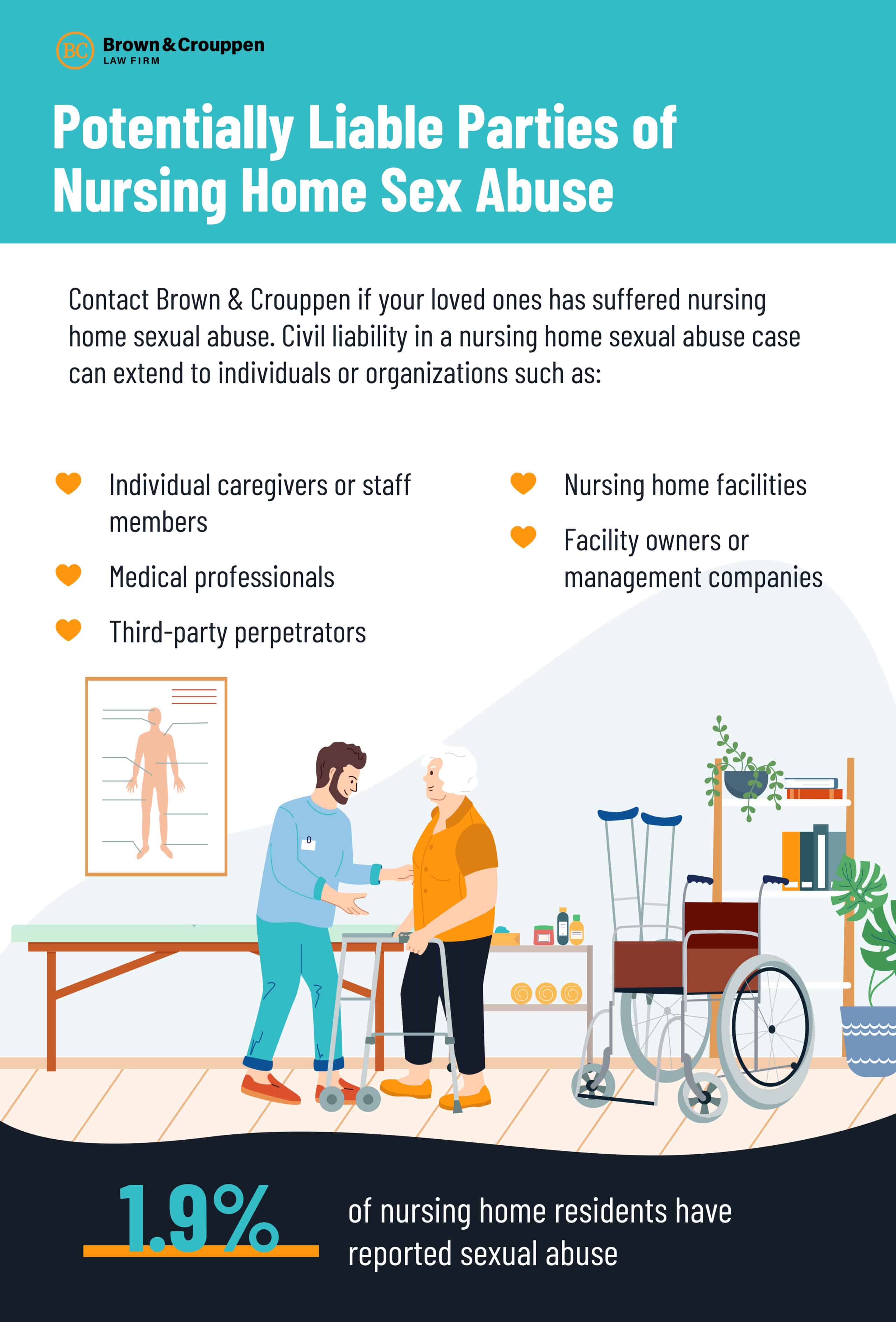Home St. Louis
Nursing Home Abuse Lawyer
Sexual Abuse
Elderly Sexual Assault Lawyer
The Midwest's Most Effective Injury Law Firm
This content has been written by a team of legal writers and reviewed by Terry Crouppen
A nursing home should be a safe haven for your loved one. Yet, many residents become victims of physical, emotional, or sexual abuse. Perpetrators may be fellow residents, staff members, or visitors to the facility. If you suspect nursing home sexual abuse and are considering legal action, Brown & Crouppen is here to help. We are a personal injury law firm with a team of 250 attorneys who have helped thousands of injured victims recover over $1 billion in compensation.
Our nursing home abuse lawyers have significant experience pursuing justice and financial compensation on behalf of abuse victims and their families. You can trust us to provide the best legal representation possible and hold those responsible for the abuse accountable. Get started with your case by calling (314) 501-9510 or requesting a free case evaluation online.
- What Is Nursing Home Sexual Abuse?
- What Are the Signs of Elder Sexual Abuse?
- Responding to Suspected Sexual Abuse in a Nursing Home
- Who Is Liable for Nursing Home Sexual Abuse?
- Damages for St. Louis Victims of Elder Sexual Abuse
- Contact Experienced Nursing Home Sexual Abuse Lawyers Today
- Related Reading
- Sources

Use our guide to learn how to handle nursing home abuse and neglect, along with key legal considerations and insights.
What Is Nursing Home Sexual Abuse?
Nursing home sexual abuse involves unwanted intimate contact with a resident by staff members, fellow residents, or facility visitors.
Sexual abusers often prey on nursing home residents due to their vulnerability. Many have disabilities, such as dementia, that prevent them from reporting abusive actions. Sexual abuse may include the following:
- Unwanted touching, particularly of the victim’s breasts or genitals
- Forcing a victim to undress
- Forcing the victim to observe the perpetrator masturbating or
- Forcing the victim to view pornography
- Taking sexually explicit photographs or videos, including pictures or videos of private personal care, such as bathing or dressing
- Rape, including forced penetration or intercourse
Sexual abuse is currently the least commonly reported form of elder abuse in nursing homes and other institutional settings. According to the World Health Organization, 1.9 percent of nursing home residents have reported sexual abuse, while 0.7 percent of nursing home staff members have admitted committing sexual mistreatment.
However, the real numbers are likely much higher. Sexual abuse often goes unreported. This is probably because of the social stigma surrounding sexual assault or fear of retaliation. Also, many victims have mental or physical disabilities that prevent them from apprehending the abuse or recounting their victimization.
What Are the Signs of Elder Sexual Abuse?
Signs of sexual abuse of elderly individuals include the following:
- Unexplained bruises on the thighs, buttocks, or breasts
- Unexplained pelvic or genital pain or bleeding
- Torn or stained undergarments
- New genital infections
- Discomfort when standing, walking, or sitting
Not all elder sexual abuse victims show physical symptoms. Primary signs of abuse may be emotional or social, such as:
- New fears of particular places, situations, or people
- Behavior or sleep changes
- Social withdrawal
- Depression
- Sudden onset of panic attacks, post-traumatic stress symptoms, or suicidal thinking
Perpetrators may use intimidation or threats to discourage victims from reporting abuse. Be aware of any unusual interpersonal behavior, including increased anxiety, fear, or aggression around a specific person.
Responding to Suspected Sexual Abuse in a Nursing Home
Sexual abuse of elderly nursing home residents can cause severe long-term mental, physical, and emotional pain. If you suspect elder abuse in a nursing home setting, protect the resident’s well-being by taking the following steps:
- Believe every report – For every reported case of elder abuse, an estimated 23 cases go undetected. Residents rely on loved ones to take their disclosures of abuse seriously.
- Ensure the resident’s safety – Seek medical care for any reported injuries, including those that appear minor. If the resident is in ongoing danger, consider moving them.
- Alert authorities of immediate threats – If your loved one is at risk of immediate physical harm, call 911.
- Document evidence of abuse – Obtain photographs of any physical harm, such as bruising or clothing stains. Keep an ongoing record of such evidence, including documentation of conversations with your loved one.
- Report your suspicions to facility administrators – Document your conversation and list the steps the facility will take to investigate the issue.
- File a report with your state’s senior services licensing department – In Missouri, you can file a report online or call the Department of Health and Senior Services at (800) 392-0210.
- Secure ongoing care: Connect the resident with medical and psychological care providers who will keep detailed treatment records.
Your state’s Long-Term Care Ombudsman can assist you in finding help and safe care for your loved one. Missouri’s Ombudsman Program is a volunteer network dedicated to preserving the rights of adults in care. Once your loved one is safe, you may pursue legal action.

Get started with a free consultation with one of our skilled Personal Injury Lawyers today.
Who Is Liable for Nursing Home Sexual Abuse?
Civil liability in a nursing home sexual abuse case can extend to individuals or organizations. Potentially liable parties include:
- Individual caregivers or staff members: These parties may include an aide, nurse, or nursing home administrator.
- Medical professionals: If the abuse involved medical procedures that were performed improperly or inappropriately, medical care providers such as doctors or physical therapists could be liable.
- Third-party perpetrators: If the person who committed the abuse was not a staff member but has access to the facility, as in the case of a maintenance worker or visiting service provider, they may be liable.
- Nursing home facilities: These institutions can face liability if they fail to implement and enforce policies and procedures to prevent abuse, inadequately screen or supervise staff members, or ignore reports or warning signs of abuse.
- Facility owners or management companies: If the nursing home operates under the direction of a management company or has corporate ownership, those entities may be liable if they were negligent in their responsibilities.
The perpetrators may also face criminal prosecution. Penalties include imprisonment, probation, fines, and orders to pay restitution to the victims.
If you are considering legal action against the individuals or organizations responsible for sexual assault against a loved one, talk to the experienced attorneys at Brown & Crouppen. Our extensive nationwide network has experience in every area of law, including sexual abuse and nursing home abuse.
We’ll take on the perpetrators and their enablers. We won’t back down from big insurance companies and powerful care institutions, leveling the playing field to get you the compensation you deserve.

Damages for St. Louis Victims of Elder Sexual Abuse
In a nursing home sexual abuse case, victims and their families may be entitled to various types of compensation, including the following:
- Medical expenses: Victims may receive compensation for costs resulting from the abuse, including hospital bills, doctor’s visits, medication, rehabilitation, and mental health counseling.
- Physical pain and suffering: The court may award compensation for pain and suffering endured from the abuse.
- Emotional distress: Sexual abuse victims often experience intense emotional distress, which may escalate into anxiety, depression, panic, and post-traumatic stress disorder. Compensation may be available to help them address these challenges.
- Loss of enjoyment: Some victims experience a reduced quality of life or feel unable to participate in activities they once enjoyed. The court may award compensation for these losses.
- Punitive damages: In cases of willful negligence or egregious misconduct, the court may award punitive damages to punish the perpetrator and discourage similar behavior.
If the perpetrator faces criminal charges, the court may order restitution as part of the sentencing process. Restitution aims to compensate victims for financial losses, such as medical bills or therapy costs. However, restitution rarely covers the full spectrum of a victim’s losses.
Potential damages depend on the case and liability circumstances. For questions about your unique situation, speak with our experienced nursing home sexual abuse attorneys in St. Louis and Kansas City. Our firm has helped thousands of families secure over $1 billion in life-changing settlements and verdicts. Let us put our decades of experience to work for you.
Contact Experienced Nursing Home Sexual Abuse Lawyers Today
When someone you love has been the victim of abuse, you need a skilled and trusted attorney on your side. At Brown & Crouppen, we bring over 40 years of experience helping injury victims. Our award-winning personal injury firm has won recognition from the St. Louis Post-Dispatch as the Best Law Firm in St. Louis. When you choose us, you can rest assured that you will receive the high-quality legal representation you deserve.
In the words of founding partner Terry Crouppen, “We focus not on big cases, not on little cases, but on people because we need to do the best job we can for everyone.” Accordingly, our attorneys serve our community both professionally and personally. We volunteer with and donate to numerous charitable organizations, including Habitat for Humanity, United Cerebral Palsy, and the Juvenile Diabetes Research Foundation.
If you need a knowledgeable and compassionate nursing home sexual abuse lawyer in St. Louis or Kansas City, we’re here for you. Call (314) 501-9394 or complete our online contact form to schedule your free consultation. There are no upfront costs or legal fees. You pay nothing unless we win your case.
Related Reading
At Brown & Crouppen, we believe in a victim’s right to be informed. If you’re interested in learning more about nursing home abuse and neglect, we encourage you to explore our free resources on the topic:
Sources
- American College of Obstetricians and Gynecologists. (2021, March). Elder abuse and women’s health. ACOG Clinical. Retrieved February 12, 2024, from https://www.acog.org/clinical/clinical-guidance/committee-opinion/articles/2021/03/elder-abuse-and-womens-health
- National Center on Elder Abuse. (n.d.). Sexual Abuse in Nursing Homes: What You Need to Know. The National Consumer Voice for Quality Long-Term Care. Retrieved February 12, 2024, from https://theconsumervoice.org/uploads/files/issues/sexual-abuse-issue-brief-FINAL.pdf
- The National Crime Victim Bar Association. (2015, March). Civil Justice for Victims of Crime in Missouri. Missouri Department of Health and Senior Services. Retrieved February 12, 2024, from https://health.mo.gov/seniors/pdf/cj-booklet.pdf
- Parks, M., Schimmel, A. I., & Rhodes, A. (2022, November). Insurance coverage issues in sexual-abuse cases. The Advocate. Retrieved February 12, 2024, from https://www.advocatemagazine.com/article/2022-november/insurance-coverage-issues-in-sexual-abuse-cases
- State of Missouri. (n.d.). Ombudsman Program | Health & Senior Services. Missouri Department of Health and Senior Services. Retrieved February 12, 2024, from https://health.mo.gov/seniors/ombudsman/program.php
- State of Missouri. (2018, August 28). Title XII PUBLIC HEALTH AND WELFARE Chapter 198. Revisor of Missouri. Retrieved February 12, 2024, from https://revisor.mo.gov/main/OneSection.aspx?section=198.070&bid=34878&hl=198.070%25u2044
- State of Missouri. (2017, January 1). Title XXXVIII CRIMES AND PUNISHMENT; PEACE OFFICERS AND PUBLIC DEFENDERS Chapter 565. Revisor of Missouri. Retrieved February 12, 2024, from https://revisor.mo.gov/main/OneSection.aspx?section=565.184
- Yon, Y., Ramiro-González, M. D., Mikton, C., Huber, M., & Sethi, D. (2018). The prevalence of elder abuse in institutional settings: a systematic review and meta-analysis. European Journal of Public Health, 29(1), 58–67. https://doi.org/10.1093/eurpub/cky093. Retrieved February 12, 2024, from https://academic.oup.com/eurpub/article/29/1/58/5033581?guestAccessKey=482da8b7-f9f4-4205-811d-0dd9788cdbb1&login=false.
FREE CASE EVALUATION
OUR OFFICE
Brown & Crouppen Law Firm
Address: 4900 Daggett Ave., St. Louis, MO 63110
Phone: (314) 501-9510
Our Results
TESTIMONIALS

SCHEDULE A FREE CONSULTATION

